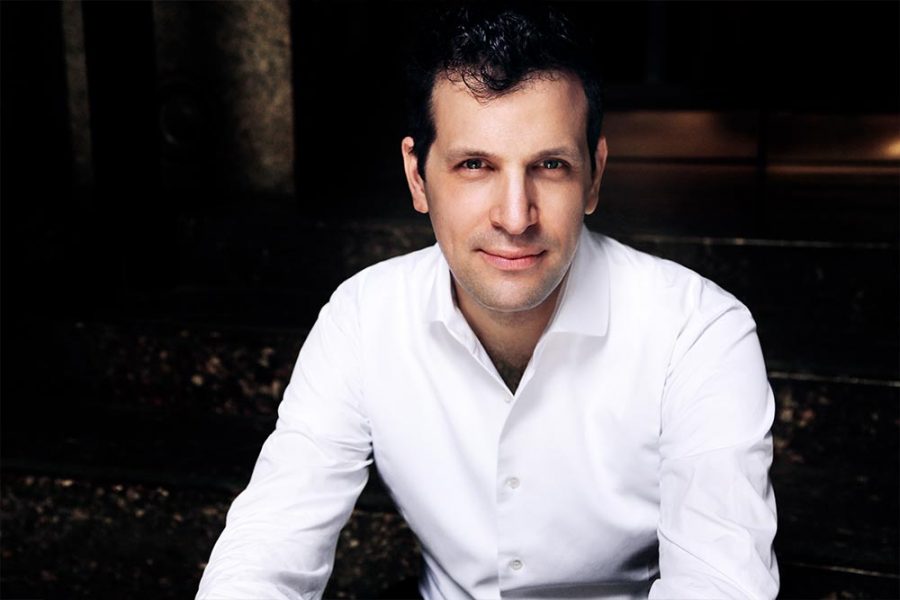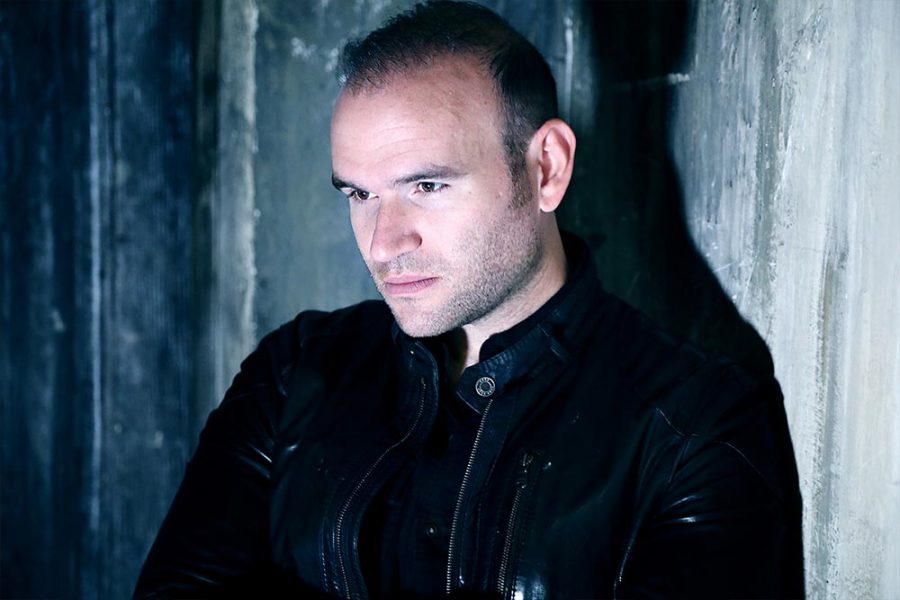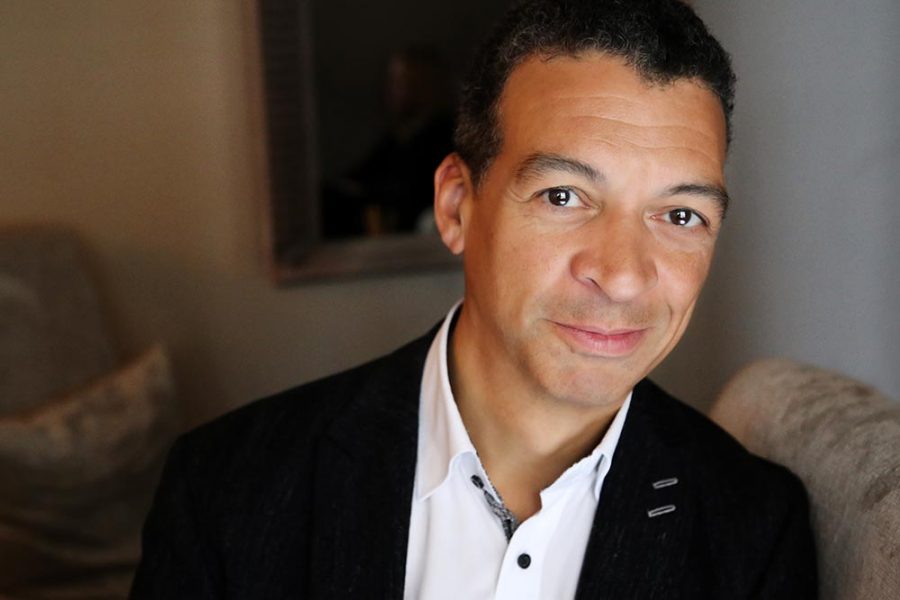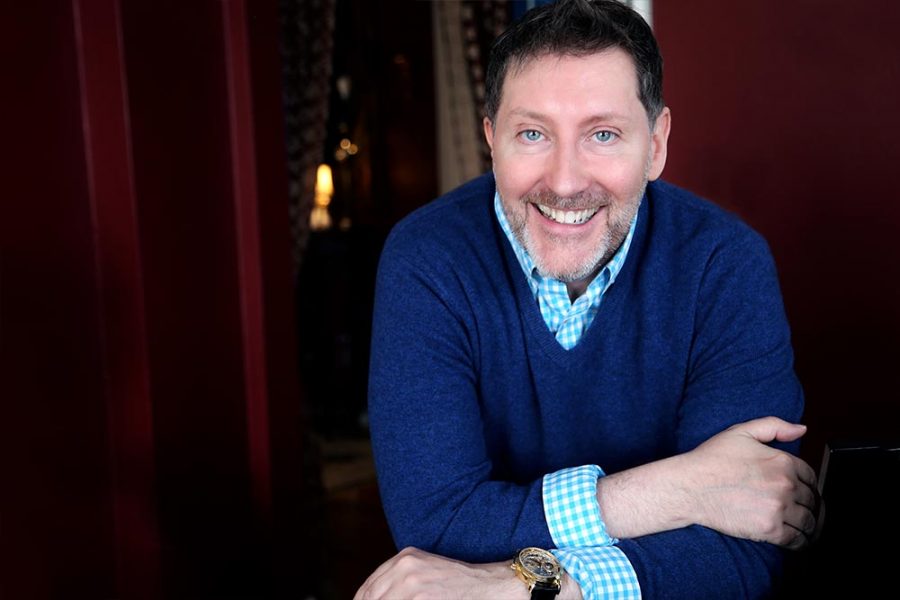The State of Opera: Michael Dean

April 2015
Words by
Emer Nestor
Photos by
Frances Marshall
Having carved an impressive solo career in the worlds of opera and oratorio, bass-baritone Michael Dean has frequently tread the boards of the New York City Opera, where he has performed the title role in Le Nozze di Figaro, Leporello in Don Giovanni, George in Of Mice and Men, and Papageno in Die Zauberflöte.
His latest appearances include Gregorio in Roméo et Juliette with the Los Angeles Opera; the title role in Don Giovanni, and Silva in Ernani at the Landestheater in Linz, Austria; Le Nozze di Figaro in Antwerp, Belgium; Of Mice and Men at Arizona Opera; and Colline in La bohème in Strasbourg and Berlin. Dean is particularly known for his sensitive and insightful performances of Early Music. Recognition of his talents led to his faculty appointment at UCLA as Associate Professor and Chair of Vocal Studies.
Dean shares his thoughts on his relationship with opera, his teaching style, and the current state of opera within America’s cultural landscape.
I loved classical music the most, but I really couldn't stand opera! I didn't understand it, and the vocal style was just so intense."

How did you become invovled in the world of Opera, and indeed singing in general?
My mother taught me to read music when I was so little that I don’t remember not being able to read music. She sat with me at the piano and we would harmonize any songs she could find. I studied piano and sang in choirs all the time. By the time I was in high school I was in five different choral groups at once. I loved classical music the most, but I really couldn’t stand opera! I didn’t understand it, and the vocal style was just so intense. I suppose it scared me a bit. I liked musical theatre, and performed quite a bit of that when I was young, but it wasn’t until college that I was asked by the voice professors (who heard me audition for the choir) to audition for a role in the opera. I was surprised to find out how much I loved it.
I studied at the University of California at Santa Barbara for 2 years, then transferred to the San Francisco Conservatory of Music. Neither of them were world-renowned schools at the time, but I got lucky and had excellent voice teachers at both schools. After a 2-year apprenticeship at the San Francisco Opera in the Merola Program, I did my graduate work at the Curtis Institute of Music in Philadelphia, studying with Marlena Malas. It was there that my skills got pushed to the next level.
As a performer, how important is it to you to engage with the repertoires and stylistic challenges of each musical era?
I think the most boring thing in the world would be to perform everything the same way. Opera singers are re-creating something that someone else wrote. If we sing everything the same way, and don’t pay attention to the musical world each composer was living in, what the spirit of the time was, etc…, then it’s like a cook who just makes the same meal over and over, but just puts it on a different colored plate. I want the whole flavour to change, the texture, everything, with each different style of music. It’s why I became a musician in the first place — the excitement of a constantly surprising and changing landscape.
What attracts you most to the operatic writing of the Baroque era?
I think the purity of it, how clean and exposed it is. The singer must call upon all of his/her best vocal technique to make the optimal sounds, and do very difficult coloratura passages, all within the context of sensitive phrasing and characterization. I also love the improvisatory nature of it, how the structure is set up so that the artist can ornament and do his/her own cadenzas, and do it differently every time. It’s a lot like jazz. It’s a perfect combination of structure and freedom, that is unlike any other era of opera.
To what degree has your voice and style changed/evolved over the past few years?
Oddly, as a bass-baritone, you expect the voice to get lower as you get older, but I have found my upper range to have grown recently. I am singing higher parts (and putting in higher cadenzas) than I ever would have dared 20 years ago. It’s fun! As a low voice you don’t get the thrill of high notes in the same way tenors and sopranos do; I’ve enjoyed experimenting with that part of my voice a lot lately.
Why did you take on a teaching role at UCLA?
I loved the atmosphere there, it’s like a conservatory within a university, so it’s the best of both worlds. I am much more excited about my student’s accomplishments than I am about my own. It’s wonderful to work with a new crop of young voices each year, it inspires all of us to keep our teaching at the highest possible level. They are depending on us to help them hone the skills that will carry them into their musical lives.

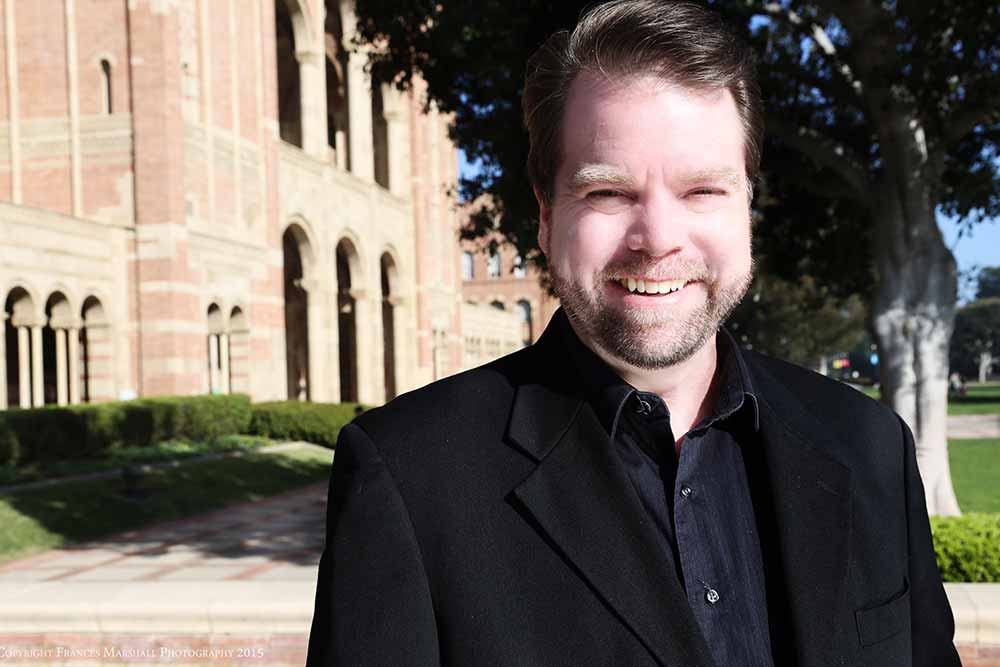


My teaching aesthetic is very much about giving each singer the foundation of healthy technique, while never letting them lose what is unique about their own voice. "

How do you combine a teaching career with that of performing, and how would you describe your pedagogical aesthetic?
It’s easier these days for me to combine the two roles, because lately I’ve been performing a lot of concert repertoire. Working with symphony orchestras does not take me away for months at a time, as opera does.
My teaching aesthetic is very much about giving each singer the foundation of healthy technique, while never letting them lose what is unique about their own voice. There are many ideas of technique that are universal — things that all singers can benefit from thinking while they are singing. But I don’t like it when I can’t tell one singer from another; I certainly have my taste when it comes to voices, but that doesn’t mean everyone should sound alike.
It’s also important to me that singing is a physically pleasurable experience, even though it is hard work. There is nothing more exhilarating than singing onstage with an orchestra, no microphone, and feeling your resonance fill a theatre. It goes straight from your body into the bodies of your audience members, no speakers, no auto-tune, no sound engineer; we are, after all, the only form of singing that is performed without amplification. That’s a unique challenge technically, but it is the most wonderful thing we can give the world, because it’s only from us that people can have that experience — just a physically joyful experience for performer and listener.
Above all, I don’t want my students straining, or pushing their voices. I want them to be healthy and smart, and to sing until they are very old, if they so choose.
So many opera singers have stunning voices but poor acting skills — do you think this matters, and if so, what do you do to improve upon your acting capabilities?
Yes, of course they need to be able to act. I think the idea that opera singers can’t act is based on two things: 1) There’s a myth that in the old days, no singers acted because the rich people watching didn’t care, they just wanted to hear the voices. I don’t think that could possibly have been true. I have read accounts from a century ago of such riveting acting on the operatic stage that people in the audience were fainting. 2) Sometimes the technical demands of this kind of singing require the singer to limit his/her physical movements and facial expressions for a moment while he/she executes something particularly difficult. But we try not to let that happen too often.
The idea of acting while singing opera is founded on a principal of having one’s technique working in the background, while the audience is focused on the emotion. But often it is the tone quality, the vocal line itself, that contains the emotion, so sometimes you just have to execute the sound and let the emotion get carried by that. It’s what makes our art form different from regular acting. Unlike regular actors, we can’t just scream when our character is angry, or burst out with actual tears when upset.
Tell us about the innovative Chautauqua Music Festival and your association this annual event?
Chautauqua is a unique place — it was around before all the hundreds of summer opera programs were here, and it is still among the very best in the world. It is meant to help build a bridge between a singer’s training and the professional world. The standard of excellence then, is very high, so that singers understand not only what they have to do to be a professional singers, but also it gives them a chance to see how good everyone else is! It really lights a fire under them, I can tell you!
But it’s not just the voice teaching that is of the highest level; what makes Chautauqua unique is the level of coaching there. Singers need so much more than the vocal technique we teachers give them. Their coaches play an enormous role, sometimes an even greater role, in their development as artists. The difference between a talented singer who makes it, and one that doesn’t, often lies in coaching. Refined languages, sensitive, intelligent phrasing, deep understanding of the details of the music — these are the things a really great coach gives a singer. Combined with their teacher’s instruction, which gives them the technical ability to physically make the sounds we have to make, it really adds up to a powerful education. It’s an honor to be on that prestigious faculty.
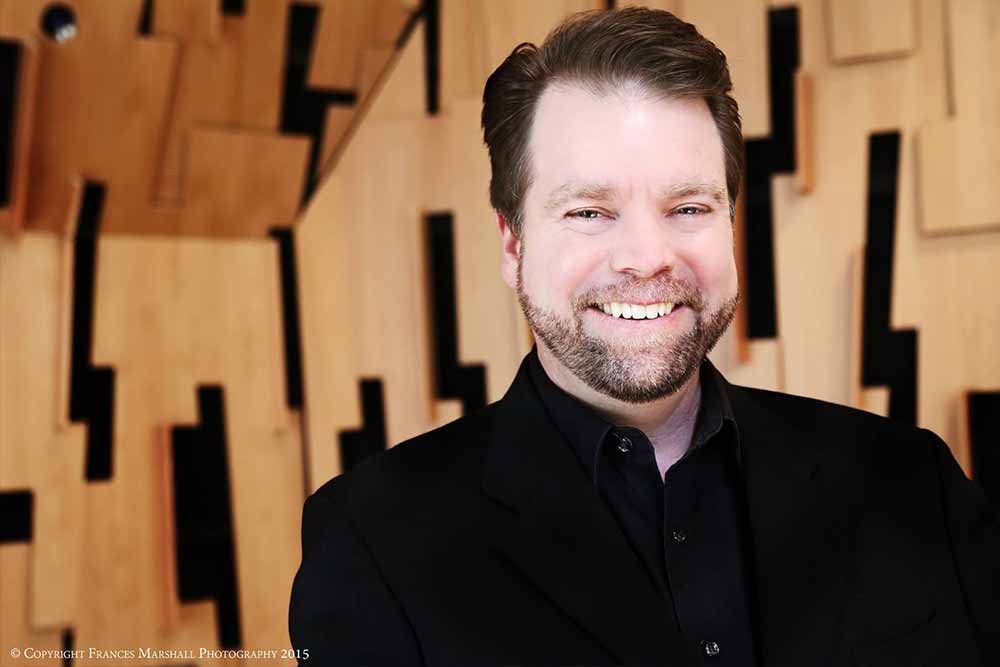


What are your thoughts on the state of opera companies today at home and in Europe?
Opera is an expensive art form, no matter how you do it. It was once understood that opera was the favoured hobby of the wealthy, so of course it was fully supported, to great heights, by those types of people many years ago. They wanted a place to socialize, and it was understood that the opera was where you did that, if you were of a certain level in society. So they made it big and lavish, to match everything else they did — giant theatres, expensive costumes, enormous fees for the stars. Nowadays, the wealthy have other hobbies (cars, wine, etc…), so those are the industries that have that crowd handing over their cash. Opera is now like any other part of the performing arts: people love it, but they’re not willing to pay a lot for it, so it has to work hard to stay alive.
One thing I think would help opera companies in America would be to model themselves on the ‘fest’ system that is still going in the German-speaking countries. Here a company of singers do all the operas for that particular house, with the occasional guest artist for particular roles, but mostly done by the company of singers. That’s where we get the term ‘opera company’ after all.
Ballet still does it that way, as do most theatre companies. Instead of flying in each singer from the far reaches of the earth to sing one role, they should just employ a stable of 30 or 40 singers to live in that city, and sing all the roles, big and small, in their operas. If you pay them enough to support themselves and give them benefits, you will have a company of spectacular singers. Audiences get to know particular artists they love, and anyway, I think the audiences are going to see their favorite operas, not particular singers any more. A handful of singers still sell tickets, but mostly the names who sell tickets are Mozart, Puccini and Verdi. As long as the opera company’s singers are of high quality, the audience will be happy.
Having premiered many new works how do you feel about contemporary opera?
I love that composers are so interested in opera. I wish they would pay attention more, however, to what makes it opera. It’s not just notes that happen to be sung. The art of writing for the voice is different than for any other instrument. Understanding the vocal instrument takes years of study. I’m actually giving voice lessons now to a composer who wants to write opera, but felt he needed to take voice lessons to understand it! How great is that?!! Too few composers take the time to understand the voice, and how it melds with text. A few are excellent at it, for example John Musto, and William Bolcom. But guess what? — those two are married to singers! A composer’s experience of writing for voices needs to be honed over many years.
Also the choice of libretto used to be something people put some serious thought into, and it seems these days that too many composers dig up some weird story they find cool without any thought as to whether or not it will make a good opera. Why do we never see comedies any more? How about love stories? It’s always dark, depressing, twisted material! A little of that is OK, but look at the operas that have stood the test of time. What was it about them that caused that phenomenon? Don’t we think about the fact that Le Nozze di Figaro, or La bohème, or Falstaff, are still being performed every day somewhere in the world, centuries after they were written? Don’t today’s composers want that for their own work? Composers need to study those operas and figure out why they work so well.
I think the harmonic and melodic language of modern music has gotten so dark, confusing and twisted, that it’s hard to write anything whose subject matter isn’t also like that. Many would disagree with me, but all the greatest operas were written by composers who had a deep knowledge of what makes opera work. I think modern composers can do the same thing if they take the time and effort to understand this unique art form. Otherwise, we will continue to have 1 run of performances of a new piece, and then it will never be heard again. I hope that trend can be turned around.
What are your hopes for opera going forward, and what can you do to contribute to the process?
My hope is that we can find a way to finance this art form without depending on high ticket prices. If we could make it accessible to all without diminishing its quality, then I think more and more people will come to love it as so many of us do. On my end, as a singer and teacher, it is my job to keep my own singing at the highest level possible, and also to teach the next generation of singers the best way to make their voices last for years and years.
All images displayed in this article are subject to copyright.
Share this article


